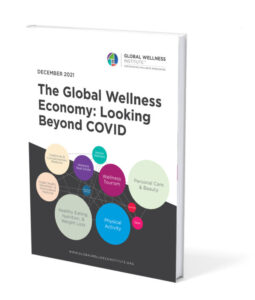By Liza Horan, Editor
PHOTOS/Pexels
Did it take a pandemic to wake us up to the importance of wellness?
That’s the emerging benefit from Covid-19, according to Global Wellness Institute researchers Katherine Johnston and Ophelia Yeung. They just released an in-depth report on the wellness economy and found that while lockdown curbed certain sectors within the industry, the awareness around health and wellbeing from the experience has effectively strapped rocket boosters to the global wellness economy.

The report is free to download here.
In their 110-page report, “The Global Wellness Economy: Looking Beyond COVID,” the authors share seven key insights about how values, priorities and behaviors are shifting toward wellness. And the knock-on effect of those individual and societal changes means the global wellness industry is on track to grow from $4.4 trillion in 2020 to nearly $7 trillion in 2025.
Here are the wellness trends that emerged during the pandemic:
 Self-care for preservation and survival. It’s not about pampering now as much as enabling yourself to function well on all levels. “The concept of self-care has expanded far beyond a bubble bath, a facial, a spin class, or a meditation session; it now extends to home-cooked meals, human connections, sleep, nature, financial wellness, search for purpose and meaning, and much more. The pandemic has revealed the multidimensional and omnipresent nature of wellness. For our survival and for our sanity, wellness is no longer something that we do for an hour a day, a few times a month, or only when we are on vacation; it is an essential focus to be embedded in our daily lives and priorities,” says the report.
Self-care for preservation and survival. It’s not about pampering now as much as enabling yourself to function well on all levels. “The concept of self-care has expanded far beyond a bubble bath, a facial, a spin class, or a meditation session; it now extends to home-cooked meals, human connections, sleep, nature, financial wellness, search for purpose and meaning, and much more. The pandemic has revealed the multidimensional and omnipresent nature of wellness. For our survival and for our sanity, wellness is no longer something that we do for an hour a day, a few times a month, or only when we are on vacation; it is an essential focus to be embedded in our daily lives and priorities,” says the report.
 Preservation as a lifestyle and public health priority. The awareness of preventing infectious diseases and preventing chronic disease, plus the access to healthy living resources, has grown among citizens and government. The pandemic emphasised the important of creating healthy lifestyle habits.
Preservation as a lifestyle and public health priority. The awareness of preventing infectious diseases and preventing chronic disease, plus the access to healthy living resources, has grown among citizens and government. The pandemic emphasised the important of creating healthy lifestyle habits.
 Wellness and science must move toward each other. The wellness movement is very much a grassroots one, propelled by consumers and businesses, and the GWI says science needs to catch up. “While many popular wellness modalities have been around for hundreds or thousands of years, scientific research and new technologies are now able to test and validate their benefits (e.g., for yoga, meditation, plant-based medicines, chiropractic, acupuncture, and psychedelics), leading to a gradual acceptance of some by mainstream medicine. Still, the consumer adoption of wellness practices is accelerating at a much faster pace than the scientific research,” the authors write. (Johnston covered this point in her interview on mental wellbeing for The Mindstream Podcast. Listen or read the transcript.)
Wellness and science must move toward each other. The wellness movement is very much a grassroots one, propelled by consumers and businesses, and the GWI says science needs to catch up. “While many popular wellness modalities have been around for hundreds or thousands of years, scientific research and new technologies are now able to test and validate their benefits (e.g., for yoga, meditation, plant-based medicines, chiropractic, acupuncture, and psychedelics), leading to a gradual acceptance of some by mainstream medicine. Still, the consumer adoption of wellness practices is accelerating at a much faster pace than the scientific research,” the authors write. (Johnston covered this point in her interview on mental wellbeing for The Mindstream Podcast. Listen or read the transcript.)
 Leaning into nature for nourishment and healing. Lockdown caused us to go outside to enjoy nature, and research shows that behaviour is sticking for its regenerative and positive influence on our health and wellbeing.
Leaning into nature for nourishment and healing. Lockdown caused us to go outside to enjoy nature, and research shows that behaviour is sticking for its regenerative and positive influence on our health and wellbeing.
 Balancing physical and virtual connections. Even before the pandemic, there was a global crisis of loneliness and social isolation in lockdown brought this to the fore. We learned how vital staying connected to others is for our wellness, yet still seeking the right mix of communications and togetherness in various forms.
Balancing physical and virtual connections. Even before the pandemic, there was a global crisis of loneliness and social isolation in lockdown brought this to the fore. We learned how vital staying connected to others is for our wellness, yet still seeking the right mix of communications and togetherness in various forms.
 Mental wellbeing takes center stage. “Our mental unwellness has been a growing public health crisis for some time … the Covid-19 pandemic accelerated the deterioration of our collective wellbeing,” the report says. But now everyone is keenly aware of it, and energy toward mental wellness is happening across homes, schools, workplaces, communities, and governments. (See our Mental Wellbeing 2021 package for in-depth content on this shift.)
Mental wellbeing takes center stage. “Our mental unwellness has been a growing public health crisis for some time … the Covid-19 pandemic accelerated the deterioration of our collective wellbeing,” the report says. But now everyone is keenly aware of it, and energy toward mental wellness is happening across homes, schools, workplaces, communities, and governments. (See our Mental Wellbeing 2021 package for in-depth content on this shift.)
 A global values reset. Perhaps the most exciting trend from the GWI report, this insight by Johnston and Yeung centres on a silver lining of the pandemic: “For many of us, being isolated at home has become a time for self-reflection and contemplation on our careers, family, and relationships, and even extending to deeper issues like our life purpose, gratitude, and compassion for others.” Racial discrimination, climate change, health inequities, and conscious consumers are among the universal themes we’ve faced and are trying to resolve on individual, community, national, and global levels. The precepts of what “wellness” means are extending beyond medical health.
A global values reset. Perhaps the most exciting trend from the GWI report, this insight by Johnston and Yeung centres on a silver lining of the pandemic: “For many of us, being isolated at home has become a time for self-reflection and contemplation on our careers, family, and relationships, and even extending to deeper issues like our life purpose, gratitude, and compassion for others.” Racial discrimination, climate change, health inequities, and conscious consumers are among the universal themes we’ve faced and are trying to resolve on individual, community, national, and global levels. The precepts of what “wellness” means are extending beyond medical health.
The important report is one of a series of in-depth studies the Global Wellness Institute produces regularly to track the data and trends happening across the many sectors that comprise the wellness industry.
RELATED CONTENT
- Pandemic hurt and helped growing wellness economy
- GWI researcher Katherine Johnston discusses the mental wellness economy on The Mindstream Podcast
- View all Mindstream content covering the Global Wellness Institute.
#2021GWS

Comments